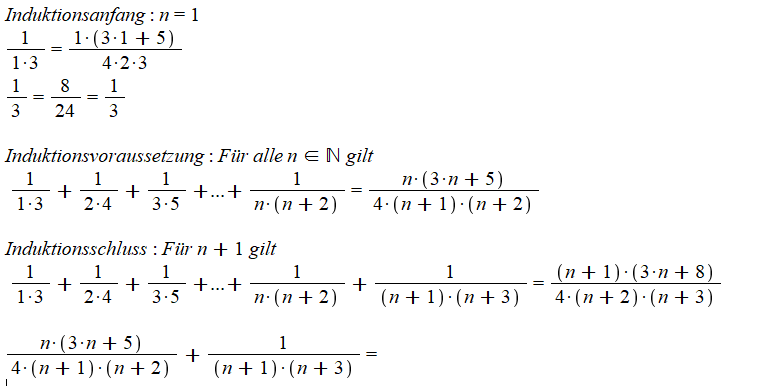Aufgabe:

Text erkannt:
Aufgabe 1:
Vollständige Induktion
Beweisen Sie, dass für alle natürlichen Zahlen n die folgende Summenformel gilt:
\( \frac{1}{1 \cdot 3}+\frac{1}{2 \cdot 4}+\frac{1}{3 \cdot 5}+\ldots+\frac{1}{n \cdot(n+2)}=\frac{n \cdot(3 \cdot n+5)}{4 \cdot(n+1) \cdot(n+2)} \)
Problem/Ansatz:

Text erkannt:
Induktionsanfang: \( n=1 \) \( \frac{1}{1 \cdot 3}=\frac{1 \cdot(3 \cdot 1+5)}{4 \cdot 2 \cdot 3} \)
\( \frac{1}{3}=\frac{8}{24}=\frac{1}{3} \)
Induktionsvoraussetzung : Für alle \( n \in \mathbb{N} \) gilt \( \frac{1}{1 \cdot 3}+\frac{1}{2 \cdot 4}+\frac{1}{3 \cdot 5}+\ldots+\frac{1}{n \cdot(n+2)}=\frac{n \cdot(3 \cdot n+5)}{4 \cdot(n+1) \cdot(n+2)} \)
Induktionsschluss : Für \( n+1 \) gilt \( \frac{1}{1 \cdot 3}+\frac{1}{2 \cdot 4}+\frac{1}{3 \cdot 5}+\ldots+\frac{1}{n \cdot(n+2)}+\frac{1}{(n+1) \cdot(n+3)}=\frac{(n+1) \cdot(3 \cdot n+8)}{4 \cdot(n+2) \cdot(n+3)} \)
\( \frac{n \cdot(3 \cdot n+5)}{4 \cdot(n+1) \cdot(n+2)}+\frac{1}{(n+1) \cdot(n+3)}= \)
Hallo ich komme bei dieser Aufgabe zur Vollständigen Induktion irgendwie nicht weiter.
Auh wenn ich die Brüche zusammenfasse, komme ich nicht auf die Lösung.
Gruß Jan